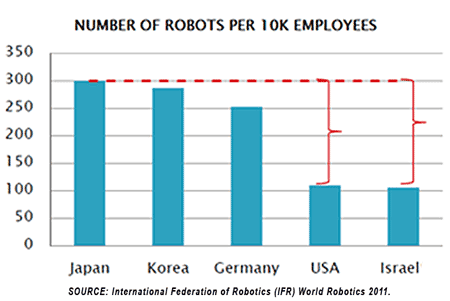
Robohub.org
Interesting conclusions from Israeli study on robot adoption

In a joint research study by Israel-based RoboLogics Ltd. and the Israeli Manufacturers Association, 72% of respondents considered that their processes were suitable for robotics automation. However, 66% cited complexity and lack of familiarity with the technology as one of the main reasons for NOT having implemented robots in the past. Facilitating the user-robot interaction and robot-to-robot collaboration was what they were referring to when asked to define “complexity” and “lack of familiarity with the technology”.
“Countries like the US and Israel face multiple difficulties keeping the manufacturing value of their own inventions within their borders. While both countries excel in innovation, they lack the competitive advantage required to manufacture many of their products – even for local consumption. High wages compared to countries like China and India, and low automation levels compared to countries like Japan, Germany and Korea, are some of the key disadvantages that local manufacturers face when trying to compete with their global counterparts.”
Bottom line: New tech robots, i.e., those which are easily trainable, relatively safe to work alongside humans, and where user-robot interaction and robot-to-robot collaboration are convenient and understandable to all, will be the easiest to incorporate for small and medium-sized enterprises (SMEs), according to the survey.
tags: ifr



